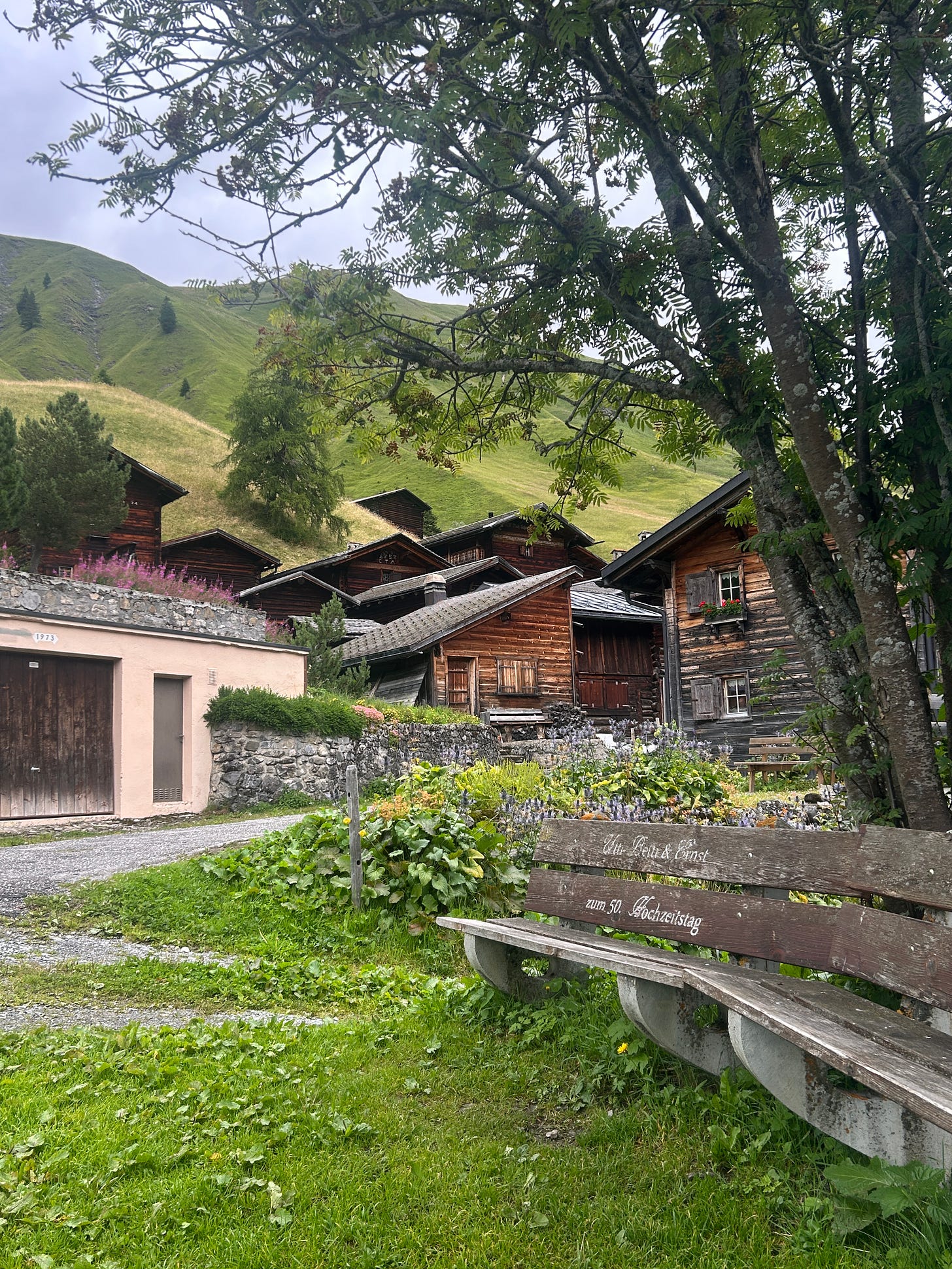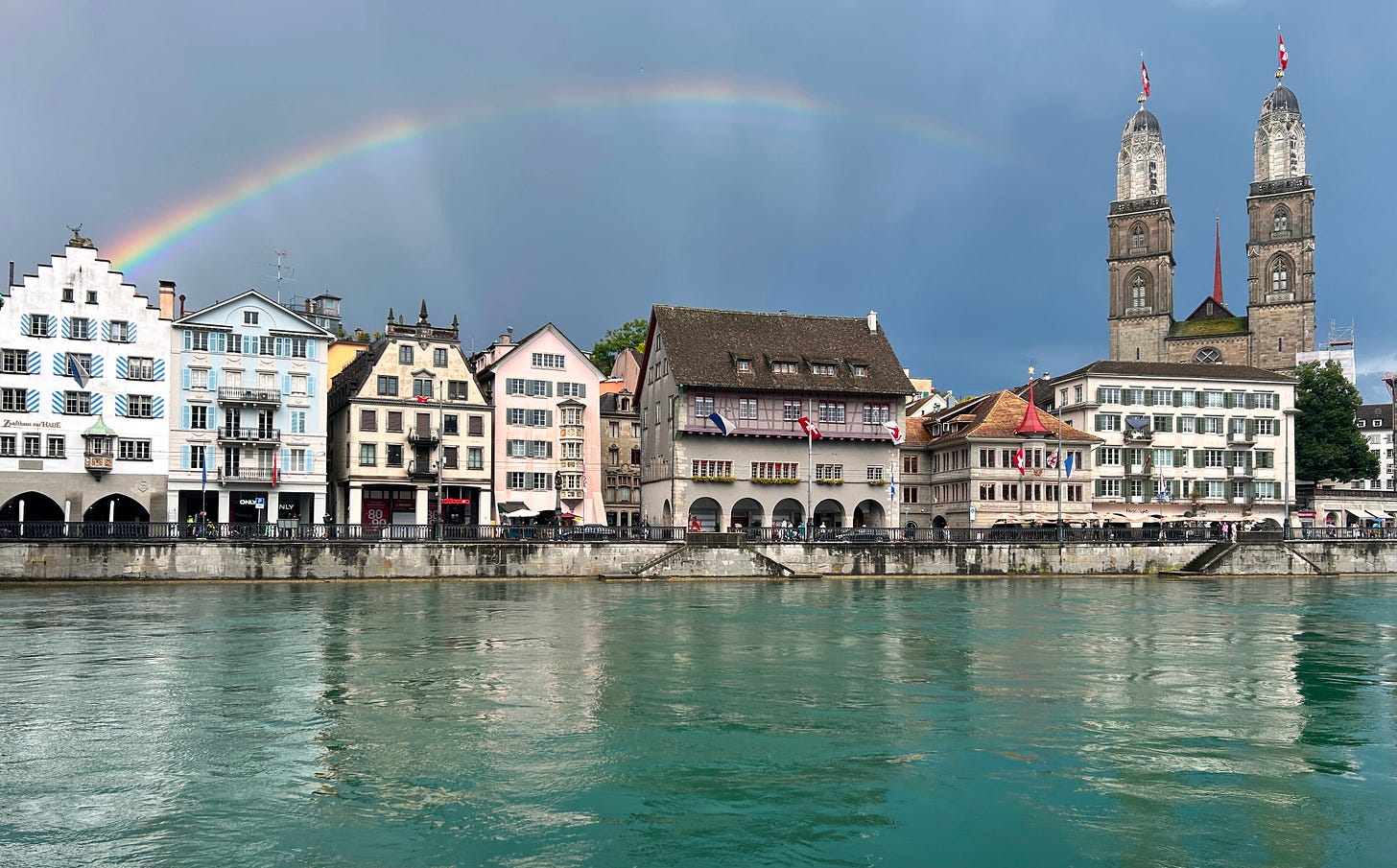My Americanness is with me always. I could be dressed in lederhosen and wire frame glasses straight from Sprockets and even the most provincial European would have me pegged from 100 meters out: middle-aged American male. My wife, Susan, looks—and in fact, is—from an entirely different tribe than me, and yet is similarly, undeniably American. We are who we are and we’re not trying to fool anyone.
But when we’re on vacation, particularly a European vacation, we don’t want to live like Americans. Even if I couldn’t be more recognizably American if I were walking around in Hollister shorts and a Yankees cap (which I have never done and never will despite watching Rod Guidry pitch admirably for the West Haven Yankees in the ‘70s), I want to live like a European, at least for a week or two.
A European vacation never fails to elicit a gleeful national inferiority complex, a sort of oppositional celebration of everything that’s wrong with America. You quaff reasonably priced natural wines, marvel at the mass transit, the sensible portion size, and the iPadless kinder running around, healthy and unsupervised. You admire their SUV-free roadways, their walkable cities, their egalitarian home sizes. It’s a progressive’s fantasy of a social democracy, which is a lot spiffier in an unshakably prosperous nation like Switzerland, of course, but let’s not get bogged down in the details. It’s my European vacation and so it’s my European fantasy.
Which is why our timing, arriving in Zurich on the morning of the country’s 734th birthday, would pose a challenge to my planned weeklong fantasy.
When we boarded our plane at JFK the night before, Switzerland was—after months of what they thought were productive discussions with the U.S.—expecting the U.S. to finalize a roughly 15% tariff on Swiss imports, in line with its neighbors in the European Union. But by the time we landed in Zurich and wrapped our hands aroun our first Milchakaffe, the country had been socked with a nearly forty percent tax on every watch, pharmaceutical, and exquisitely crafted bar—chocolate and gold—they sell to the U.S.. Last year, the country shipped $38 billion of goods to the U.S., two thirds of which was gold; around 4% of it was in watches.
Unbeknownst to Susan and I, by the time we took the insanely easy ten minute train ride from Zürich Flughafen (ZRH), the Swiss were pissed, and justifiably so.
I was on vacation and so remained oblivious to their ire, at least for a while anyway. By day three I was still high as a kite on the practical perks of a social democracy and the promise of the next Rosti, when my Americanness flared up at the supermarket checkout line. My first offense? Failing to weigh the bag of carrots and affixing a sticker documenting the carrot’s weight for the cashier to scan. “They must be weighed first,” the cashier said more sternly than necessary perhaps, but it was the pile on by the bystanders (two customers and a second employee) that made me wonder if maybe there was a geopolitical tang to the ensuing downpour. “Over there,” one pointed.” If the Swiss could roll their eyes the way they roll their Rs, the face of the woman behind me would have registered an epic arc of contempt.
Then, when I got confused about having to buy a box to carry my groceries (the six dozen canvas, nylon, and recycled plastic grocery bags hanging off a coat rack back in Brooklyn were of no use here) I just kept my head low, tucked the two Reislings under my arm and got the fuck out of there with my smug, liberal fantasy largely in tatters. I wanted to call back into the store: “I’m not like that!” “I’m not one of them, I swear!” I can show you my compost!” Even one of those Air Mail pins couldn’t save me now.
It pained me to be seen as part of the problem, to boorishly run counter to the ways of a country that seems to have figured out so many of the crucial aspects on how to live well. Yes, Switzerland is a wealthy, compact, incredibly homogenous city where the per capita is around a hundred thousand a year and where even the poorest people have a safe place to live within walking distance from some form of reliable public transportation. But there’s no denying that the Swiss, like so many of their European counterparts, provide more of their citizens a healthier, more equitable, more satisfying way of life.
Urban life is easier there, better planned, and far more pleasant, in part because of the water. There’s an abundance of clean, cold water flowing from the mountains into public fountains for all to drink from or hang out around and clean, green rivers that flow through the cities, which leads me to my next thing. [Link TK when I get around to writing about the pleasures of urban swimming.]

Abundance has its advantages. And when that abundance is punished, as our current President is attempting with Switzerland, it will inevitably illicit some strong, occasionally childish reactions, like the one from the old man who kicked my mountain bike tire on the sidewalk (though there was a wide berth for him to walk) or the woman who accepted my increasingly irrational Chase Sapphire card at a lodge in a tiny, improbably perfect, near ancient village at the very end of the Sapün Valley. “You didn’t vote for him, did you?” the woman asked, looking over the tops of her sensible glasses in that universal gesture of judgement, as her card reader sucked another 100 Swiss Francs from our account.
But the Swiss tariff reaction seems fueled less by ire than by just plain disappointment. Part of their Swissness lies in the confidence that they know what’s best and so they want everyone to live and behave like they do, simply because they’re right. The U.S. tariffs will certainly hurt them economically, for as long as they last anyway, but it’s the boorishness and bullying and irrationality—the Americaness of it, perhaps—that’s most offensive to them.
An impromptu dinner companion in Basel (who casually mentioned that his divorce only cost four thousand Swiss Francs) explained it best. “It’s not how you treat others,” he said of the surprise tariff announcement. “A negotiation is not an occasion to win but to arrive at a fair deal for both parties.” Switzerland, he explained, is just disappointed that we don’t see the value and logic of getting along, something Switzerland has been doing for some time now.
He had a point. But more importantly, I had a fantasy, if only for a week, and he helped restore it.


